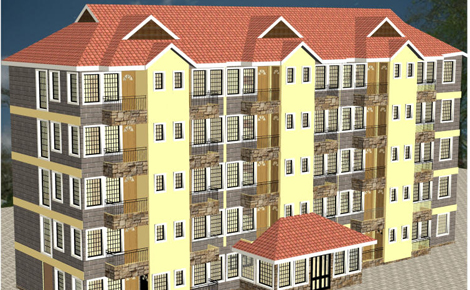 |
|
A design of Murang'a University College students’ hostel. PHOTO: BONIFACE GIKANDI |
NAIROBI: In the recent past, the growth and expansion of university education has been fast. In many major towns, there has been a rapid increase in the number of these institutions and interestingly, many more are still looking for space to open shop.
The proliferation of public and private universities has led to a housing crunch. This is mainly due to the fact that the available space is not enough to accommodate the surging number of students.
Initially, one of the major challenges most of these universities faced was getting space that could cater for offices and lecture halls.
However, with time, most of them have gained traction and some have gone ahead to buy their own buildings or to build their own especially with the growth in revenues.
The draw back has been students’ accommodation. Unlike in the past where universities pegged admission on the number of beds available, most of them are now partnering with the private sector to provide housing to accommodate the ever surging number of students.
So if you are thinking about investing in a rental property, look no further. This may be the best time to think about student rentals as real money will be guaranteed.
Rapid expansion
Robert Mahinda, a real estate agent working in a private firm in Nairobi says the rapid expansion of universities has indeed created a soaring demand for houses for students pursuing university and college education.
“Unlike in the past when admission to universities was pegged on the number of beds available, most of these institutions no longer guarantee accommodation. Consequently, private investors must come in and plug in this hole,” says Mahinda.
Experts in this industry say building rentals that target students has several advantages. “One of the benefits is that the income is assured. The cycle is predictable and when one group leaves, another is enrolled making the earnings regular,” says Collins Opiyo, a realtor.
Most students in public universities get their funding from the Higher Education Loans Board (Helb). They can use some of this money to take care of their accommodation, besides sparing some for food, books among other necessities. Most landlords ask for a whole semester’s rent upfront.
“I prefer renting out my rooms to students because every beginning of a cycle or semester, the students make a one off payment for four months. This way I rake in a tidy sum that I can use to build more rentals,” says William Kimani, a landlord in Ruiru, Kiambu County. “This means that the default rate is very low because the students pay upfront. In most cases, they pay a few months ahead due to the competition,” he adds.
“Student rentals are also cheap to build. They usually do not require luxurious finishes. Unlike structures that target the high-end market, here the units just need to be functional, clean, and well maintained, with a gloss of paint,” says Mahinda.
Due to the growing demand, some investors are building prefabricated structures, which are also in high demand. “As you know, students come from diverse social economic backgrounds. There are those who cannot afford the fairly expensive ones,” says Mahinda.
Returns
Stay informed. Subscribe to our newsletter
In most cases, the returns from a single unit are higher compared to other rentals. A single house can be occupied by several students. When you add up the pay per room, it can exceed the amount payable by other tenants. However, building residential houses targeting students has a flipside. “When university programmes are interrupted for example by student unrest, the rooms can go for months unoccupied. This leads to a loss in earnings,” says Kimani.
He adds, “In addition, the demand is usually low during vacations. The students who come for school-based programmes are unable to take up all the space available. Such times demand that the rates must go down.”
He also laments that the incidence of vandalism is very high. “The students often pilfer electrical installations like sockets and bulbs; and other moveables. Maintenance costs can be very high in the long run due to neglect, carelessness and theft.
“In addition, utility bills can easily hit the roof if there is no proper regulation. Often, there is misuse of power and water, which is equally expensive,” observes Kimani.
However, despite the drawbacks, you cannot get it wrong by investing in student rentals. Before the bubble bursts, you are assured of getting back the money you invest today.
 The Standard Group Plc is a
multi-media organization with investments in media platforms spanning newspaper
print operations, television, radio broadcasting, digital and online services. The
Standard Group is recognized as a leading multi-media house in Kenya with a key
influence in matters of national and international interest.
The Standard Group Plc is a
multi-media organization with investments in media platforms spanning newspaper
print operations, television, radio broadcasting, digital and online services. The
Standard Group is recognized as a leading multi-media house in Kenya with a key
influence in matters of national and international interest.
 The Standard Group Plc is a
multi-media organization with investments in media platforms spanning newspaper
print operations, television, radio broadcasting, digital and online services. The
Standard Group is recognized as a leading multi-media house in Kenya with a key
influence in matters of national and international interest.
The Standard Group Plc is a
multi-media organization with investments in media platforms spanning newspaper
print operations, television, radio broadcasting, digital and online services. The
Standard Group is recognized as a leading multi-media house in Kenya with a key
influence in matters of national and international interest.









